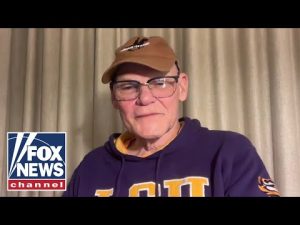In the world of international relations and diplomacy, the last few months have turned out to be quite a rollercoaster ride for the United States. Over the past 300 days, conversations about foreign policy and global alliances have dominated the headlines, often leaving citizens scratching their heads. Surprisingly for many, the current administration has jumped into a whirlwind of activity that goes beyond mere domestic policy, leading to some notable achievements. Former Acting Attorney General and now Ambassador to NATO, Matthew Whitaker, could not help but share his insights on this matter.
It has been a busy time for the administration, and Whitaker views these last several months as significant. From day one, the administration has reportedly secured eight peace deals, with a ninth on the horizon. This diplomatic endeavor marks a shift that many might not have anticipated. Additionally, there has been a considerable focus on improving defense cooperation among NATO allies, which led to an impressive commitment of increased defense spending from member countries. This was seen as a resounding victory for the administration, turning what was once a worrying narrative about abandonment of NATO into one of strength and unity among allies.
Whitaker emphasizes that President Donald Trump has indeed made NATO stronger than ever. He pointed out that many European nations previously fell into a comfort zone, neglecting military investments and border security. However, with Trump’s reelection anticipated, those nations are revving up their efforts to restore their military readiness. This shift allows American taxpayers to breathe a little easier—no longer do they have to shoulder the entirety of Europe’s conventional defense.
Now, onto the elephant in the room: Russia. The ongoing conflict in Ukraine has raised a multitude of concerns, with heavy casualties reported almost weekly. Whitaker believes that the President’s approach—engaging in dialogue with both Russia and Ukraine—is essential to bringing about an end to this conflict. His belief is that through open communication, a ceasefire and ultimate peace deal can be achieved, contrasting sharply with the previous administration’s path of isolation from Russia.
Looking at the grand design, one must wonder what defines the “Trump doctrine” in foreign policy. According to Whitaker, it revolves around a simple principle: secure a strong America at home, with a robust military and a thriving economy, while ensuring that allies remain self-sufficient. It’s an approach that ties together trade relations and global security concerns—ensuring that America stands firm while simultaneously enabling its allies to be strong players on the world stage.
As the spotlight shines on an ever-challenging relationship with China, Whitaker expressed optimism about the progress being made. Discussions between President Trump and Chinese leaders have reportedly yielded progress on issues like fentanyl trade and a balanced trade agreement between the two nations. All in all, these developments illustrate a return to a position of strength, with American interests at heart. In the ever-evolving arena of international politics, it seems there’s never a dull moment—a fact that, for many, feels a little less unsettling knowing someone is at the wheel.







